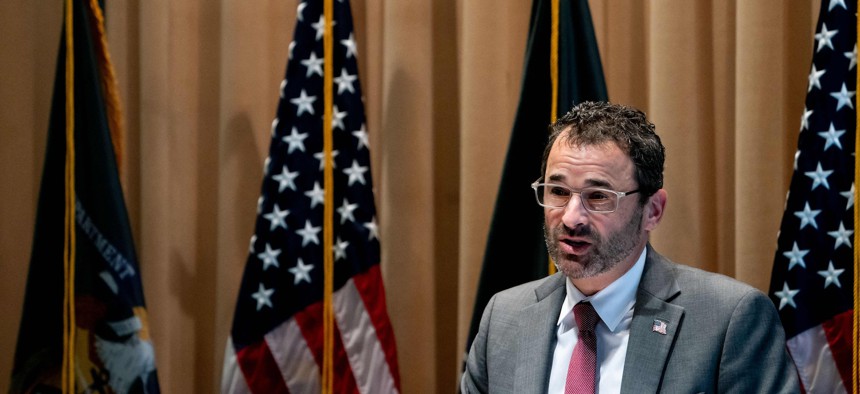IRS touts launch of Direct File pilot

IRS Commissioner Danny Werfel told reporters on Tuesday that the launch of the Direct File tax payment system is a "milestone" in the agency's history. STEFANI REYNOLDS/AFP via Getty Images
The pilot, which allows eligible taxpayers to file directly with the IRS for free, marks a new free option from the IRS, which has for decades relied on private companies to field free options for Americans.
With about a month left in tax filing season, the IRS fully launched its Direct File program on Tuesday after weeks of limited testing. The IRS says that the pilot is going well so far.
“This is a milestone,” IRS Commissioner Danny Werfel told reporters Tuesday. “Direct File marks the first time you can electronically file a tax return directly with the IRS through our website.”
So far, 15,000 filers have used it to submit tax returns, a senior administration official told reporters Monday, and the IRS expects at least 100,000 people to use the tool.
The IRS estimates that 19 million taxpayers are eligible for the pilot, which is open to taxpayers with relatively simple tax situations across 12 states.
In Arizona, California, Massachusetts and New York, taxpayers that opt for the IRS tool for their federal taxes can then transfer to a state-level tool to finish their state taxes. The other states offering the IRS tool — Florida, Nevada, New Hampshire, South Dakota, Tennessee, Texas, Washington state and Wyoming — don’t have state level income taxes.
“The early results from Direct File have shown the taxpayers like its ease and convenience,” said Werfel. “There's been a lot of excitement about the Direct File program. We have heard, from around the country, interest in the IRS adding this new option.”
The IRS decided to field the pilot in May after completing a study on its feasibility, mandated by Congress in the Inflation Reduction Act, which also gave the agency billions in funding.
The IRS has not, however, committed to feilding the program long-term after this tax season. So far, the pilot has been “encouraging,” said Werfel, “but we’re not done.”
The agency intends to finish the tax season and assess the pilot before making a decision, he said. The IRS will be evaluating interest in the tool, customer experience, the workload for the IRS, security of the system and more.
Regardless, the pilot already represents a shift in what free options the IRS offers Americans.
For decades, the tax agency has used a program with tax prep companies, called Free File, to offer most Americans a way to file their taxes for free, although the overwhelming majority of eligible taxpayers don’t use the program.
“The existing program to facilitate free online tax filing has not met the needs of taxpayers,” Wally Adeyemo, deputy Treasury secretary, told reporters Monday, noting that individual taxpayers spend about 13 hours and $270 annually to file taxes.
Werfel and other administration officials say that the pilot is evidence of ongoing work across the IRS to improve customer service — a goal the IRS is using Inflation Reduction Act money to pursue.
“Direct File… which is made possible by the President’s Inflation Reduction Act, is yet another example of how the president is helping working families save time and hard earned money,” deputy chief of staff to the president Natalie Quillian told reporters Monday.
That law gave the IRS $80 billion in funding, although since then, lawmakers have chipped away at about a quarter of that funding as part of a budget compromise with the White House last year.
If the IRS does decide to move forward with the program, funding will be essential, as Nextgov/FCW has reported. The feasibility study estimated that the cost of a tool could range from $64 million to $249 million.
Werfel told reporters that if the IRS does continue the program, the agency would use funding from IRA money to develop, modernize and update the tool and discretionary funding to maintain it.
Democrats on Capitol Hill praised the launch of Direct File on Tuesday.
Sen. Elizabeth Warren, D-Mass., called it “the start of American taxpayers having a truly free and easy option to file their taxes directly with the IRS” in a statement, saying that “for years, giant tax prep companies like TurboTax and H&R Block have gamed the system to make millions.”
Meanwhile, David Ransom — spokesman for tax prep coalition, the American Coalition for Taxpayer Rights — called Direct File “costly, confusing and unnecessary” in a statement, noting that “tax software companies already provide roughly 30 million free federal tax returns to taxpayers every year.”
Chair of the House Ways and Means Committee Jason Smith, R-Mo., called the pilot “a way to expand the power of the IRS that no one asked for” in a statement. “Taxpayers are rightfully concerned about having the already distrusted IRS function as their tax preparer, filer, and auditor.”
And 13 Republican state attorneys general have also penned a letter to Treasury Secretary Janet Yellen questioning the authority of the IRS to field the program without direct authorization from Congress.
Werfel told reporters that the IRS does not need additional authorities to run the program.
“We have a responsibility and an authority at the IRS to work with the taxpaying community to meet their needs as those needs evolve,” he said. “We see Direct File as no different than just adding another option on the menu for how taxpayers file their taxes.”






